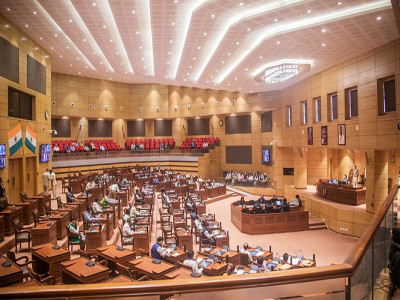
Does ULFA have any relevance in our society today?
The courage to stand for what is right is always a good thing. One should always stand for what is right and to challenge injustice right to the face. But what after that? When one rises above its challenges, the wisest of one would be he who has the quality of being humble. Staying humble is the route to prosperity.
ULFA was formed on April 7, 1979, by 6 Assamese Youth at the Rang Ghar, the famous Amphitheatre of the Ahoms at Sibsagar. The idea that led to the formation of the ULFA was to create a Sovereign Socialist Assam through an Armed struggle.
In its initial days of formation, the organization operated keeping in mind the interest of the greater Assamese society. It had the audacity to work for the Assamese society and eliminate any kind of threat posed towards its indigenous people. For instance - it gave its strong stand for societal problems such as the immigration of Bangladeshis into the land of Assam. As time progressed, however, the group began to focus more on accumulating power and material wealth, exposing holes in its ideology. As a result, they became involved in the robbery and extortion of money from wealthy businessmen and Tea Garden owners.
The organization slowly lost its initial support from the people of Assam when they went on a spree to engage in illegal activities for their own personal interest and also faced dissatisfaction among the people of Assam when the innocent youths were labeled as terrorists and in some cases maimed by the security forces. No wonder why the GOI tagged it as illegal on 27th November 1990.
Freedom and the right to live peacefully is a very important rights for any individual and if there is chaos in society this very right is snatched from the people.
There was a time when ULFA at its prime was a dreaded organization. Every parent had the fear of losing their sons to this ideology, which would have meant that there was no point of return. On top of that, our state was gaining a bad reputation for not being safe for others than the Assamese people, which was detrimental to business and growth.
Compared to those times, today we live in a much safer haven. At least we can move freely in our own birthplace. Earlier that was not the case.
And if we talk about sovereignty, I don’t know if one will agree or not. But to me, it is completely utopian in nature. I will delve into history, but simply put a few queries such as ‘Do we have enough resources or raw materials to sustain on our own?’, will we be able to have a strong economy and does our agrarian economy have the wheels within to create a strong and balanced economy and a country? And lastly, do we have the perfect region and land to create a strong infrastructure of our own as recently our region has been declared as a red zone for earthquakes and other natural calamities?
So keeping all these things in mind, a question arises will we be able to sustain ourselves as a nation? If not now, how much time will it take? There are many who argue that there are two types of society in Assam. One is the greater Assamese Society which includes money-centric people who are less bothered about the root problems of the state and focus on the accumulation of wealth and being rich. And the other is the general Assamese Society which is an amalgamation of various tribes who are bothered and worried about the day-to-day issues of the society.
Some argue to the fact that for the Assamese Society, ULFA will always be relevant. But, here I would like to say that an individual or a society or the state cannot progress alone and in fact cannot be separated. For progress and development, we need an atmosphere of peace, safety, and tolerance, where minds are utilized in research rather than scheming.
I would like to conclude this article by saying that anyone who wants to stay relevant cannot divert from their goal, and yes! the goal should obviously be rational, feasible, and not driven by distorted ideology.
Disclaimer: The opinions expressed in this article are those of the author's. They do not purport to reflect the opinions or views of The Critical Script or its editor.

Newsletter!!!
Subscribe to our weekly Newsletter and stay tuned.

















Related Comments